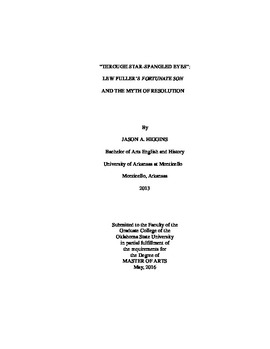| dc.contributor.advisor | Grubgeld, Elizabeth | |
| dc.contributor.author | Higgins, Jason Aaron | |
| dc.date.accessioned | 2017-02-22T22:14:59Z | |
| dc.date.available | 2017-02-22T22:14:59Z | |
| dc.date.issued | 2016-05-01 | |
| dc.identifier.uri | https://hdl.handle.net/11244/49086 | |
| dc.description.abstract | My research explores the problems of resolution in Lewis B. Puller Jr.�s Fortunate Son and suggests that this literary device in war-trauma narratives is often a fictionalized, misrepresentation of the realities of combat-injury and post-war readjustment, a lingering relic of traditional heroic mythology. Resolutions are social constructions that obscure the experiences and distort the realities of war trauma. Fortunate Son is a system of constructed resolutions, throughout which Puller�s quest toward rehabilitation and the process of readjustment become frequently interrupted by the return of the chaos narrative. This series of artificial resolutions results from the irreparable damage and the inability to heal completely from wounds of war as well as the ways in which the trauma reoccurs throughout his post-war life. Lew Puller�s extreme physical injury was the catalyst for the traumas that occurred and reoccurred throughout his life, the same precursor event that led to his death decades later. Lew Puller leaves behind a footprint of the repetition of his trauma in his autobiography. The trauma narrative appears as a cycle of improvement and decline. The physical, social, psychological, and ideological narratives discussed in this essay represent different forms of the traumas he experienced during his post-war readjustment. The traumas are told as narrative forms in the autobiography, and my analysis of the structures imposed on the traumas reveals the problems that remain unresolved after the end of the book. Veteran reintegration and recovery narratives are cultural quest narratives rooted in the instability of chaos. The trauma of war threatens the upward trajectory of the veteran reintegration narratives. Throughout Fortunate Son, patterns of movement toward resolution and recovery are followed immediately by relapse, creating a perpetual process of failures and readjustments. This tension between Puller�s desire to overcome the effects of war and his inability to recover from his traumas reveal the lasting effects of war-injury and illustrate underlying problems that have led to a systemic crisis of readjustment problems that American veterans still face today. | |
| dc.format | application/pdf | |
| dc.language | en_US | |
| dc.rights | Copyright is held by the author who has granted the Oklahoma State University Library the non-exclusive right to share this material in its institutional repository. Contact Digital Library Services at lib-dls@okstate.edu or 405-744-9161 for the permission policy on the use, reproduction or distribution of this material. | |
| dc.title | Through "star-spangled Eyes": Lew Puller's Fortunate Son and the Myth of Resolution | |
| dc.contributor.committeeMember | Takacs, Stacy | |
| dc.contributor.committeeMember | Kinder, John M. | |
| dc.contributor.committeeMember | Frohock, Richard | |
| osu.filename | Higgins_okstate_0664M_14668.pdf | |
| osu.accesstype | Open Access | |
| dc.description.department | English | |
| dc.type.genre | Thesis | |
| dc.type.material | text | |
